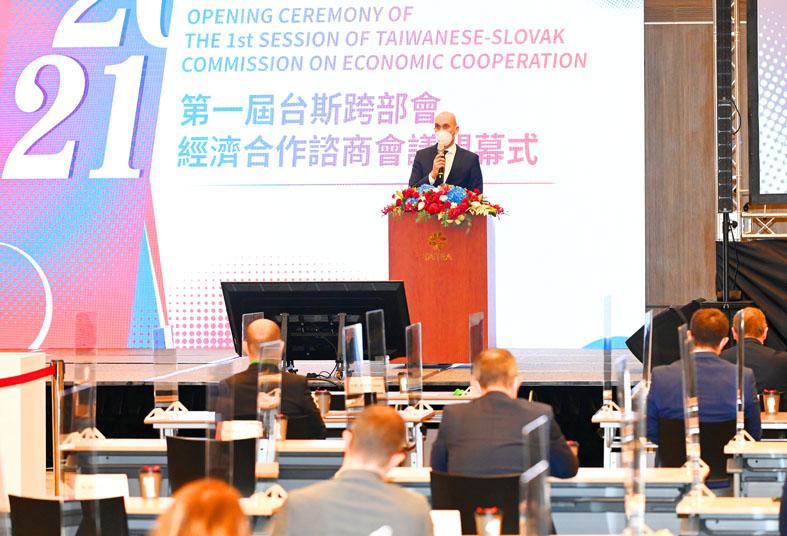Taiwan and Slovakia are headed for closer trade relations, Slovak Second State Secretary of the Ministry of Economy Karol Galek said yesterday at the Taiwanese-Slovak Commission on Economic Cooperation meeting in Taipei.
Taiwan and Slovakia’s cooperation during the COVID-19 pandemic proves the countries’ ability to work together as equal partners “in good times and the bad,” and Slovakia is ready to work with Taiwan as “small but open economies” to “find our place in an ever-changing global economy,” Galek said.
“I believe that [the meeting] will bring far-reaching discussions, allowing both sides to make the best of their economic potential for future cooperation,” he said.

Photo: Tien Yu-hua, Taipei Times
Galek said he met with National Development Council (NDC) Minister Kung Ming-hsin (龔明鑫) early yesterday, when they discussed specific areas of potential cooperation, including on smart cities, space industries, electric vehicles and semiconductors.
Both sides agreed to create a working group to explore areas of cooperation in research and development, among other fields, he said.
“Slovakia supports Taiwan,” said Galek, who is leading a delegation of 18 senior officials and 25 businesspeople from Slovakia.
Kung, who led a 66-member delegation to Slovakia in October, when seven memorandums of understanding were signed, said that Slovakia and Taiwan should deepen trade relations.
“As Taiwan and Slovakia are both free, democratic partners with shared values, we have signed agreements since establishing offices in each other’s countries to avoid double taxation, foster technology cooperation, the establishment of e-government services, economic cooperation, working holidays and many other topics,” Kung said.
Trade between the countries has grown rapidly and Slovakia receives the second-highest investment from Taiwan among EU countries at 500 million euros (US$564.64 million), creating 3,000 Slovak jobs.
“After visiting Slovakia in October, many Taiwanese companies are willing to increase their investments in Slovakia,” Kung said.
Taiwan’s donation of masks to Slovakia in the early days of the COVID-19 pandemic and Slovakia’s later donation of 160,000 vaccines to Taiwan formed the basis of trust between the two nations, he said.
“The mutual donations became what President Tsai Ing-wen (蔡英文) described as a ‘circle of good,’” Kung said.
“We hope that this circle can be extended to the economic realm,” he said.
Director-General of Economic and Development Cooperation at Slovakia’s Ministry of Foreign Affairs Lucia Kiss said in her opening address that the talks “open a wave of active and direct consultations between the ministries of both countries, and it is an important historic event in our bilateral relations.”
That the Slovak delegation decided to visit Taiwan despite the COVID-19 pandemic shows that Slovakia is determined to “deepen and upgrade economic relations with Taiwan,” she said.
Yesterday’s opening ceremony was also attended by Deputy Minister of Foreign Affairs Tien Chung-kwang (田中光) and Deputy Minister of Economic Affairs Chen Chern-chyi (陳正祺).
The Slovak delegation is visiting Taiwan until Friday.
Additional reporting by CNA

MAKING WAVES: China’s maritime militia could become a nontraditional threat in war, clogging up shipping lanes to prevent US or Japanese intervention, a report said About 1,900 Chinese ships flying flags of convenience and fishing vessels that participated in China’s military exercises around Taiwan last month and in January last year have been listed for monitoring, Coast Guard Administration (CGA) Deputy Director-General Hsieh Ching-chin (謝慶欽) said yesterday. Following amendments to the Commercial Port Act (商港法) and the Law of Ships (船舶法) last month, the CGA can designate possible berthing areas or deny ports of call for vessels suspected of loitering around areas where undersea cables can be accessed, Oceans Affairs Council Minister Kuan Bi-ling (管碧玲) said. The list of suspected ships, originally 300, had risen to about

DAREDEVIL: Honnold said it had always been a dream of his to climb Taipei 101, while a Netflix producer said the skyscraper was ‘a real icon of this country’ US climber Alex Honnold yesterday took on Taiwan’s tallest building, becoming the first person to scale Taipei 101 without a rope, harness or safety net. Hundreds of spectators gathered at the base of the 101-story skyscraper to watch Honnold, 40, embark on his daredevil feat, which was also broadcast live on Netflix. Dressed in a red T-shirt and yellow custom-made climbing shoes, Honnold swiftly moved up the southeast face of the glass and steel building. At one point, he stepped onto a platform midway up to wave down at fans and onlookers who were taking photos. People watching from inside

Japan’s strategic alliance with the US would collapse if Tokyo were to turn away from a conflict in Taiwan, Japanese Prime Minister Sanae Takaichi said yesterday, but distanced herself from previous comments that suggested a possible military response in such an event. Takaichi expressed her latest views on a nationally broadcast TV program late on Monday, where an opposition party leader criticized her for igniting tensions with China with the earlier remarks. Ties between Japan and China have sunk to the worst level in years after Takaichi said in November that a hypothetical Chinese attack on Taiwan could bring about a Japanese

STREAMLINED: The dedicated funding would allow the US to transfer equipment to Taiwan when needed and order upgraded replacements for stockpiles, a source said The US House of Representatives on Thursday passed a defense appropriations bill totaling US$838.7 billion, of which US$1 billion is to be allocated to reinforcing security cooperation with Taiwan and US$150 million to replace defense articles provided to the nation. These are part of the Consolidated Appropriation Act, which the US House yesterday passed with 341 votes in favor and 88 against. The act must be passed by the US Senate before Friday next week to avoid another government shutdown. The US House Committee on Appropriations on Monday unveiled the act, saying that it allocates US$1 billion for the Taiwan Security Cooperation Initiative